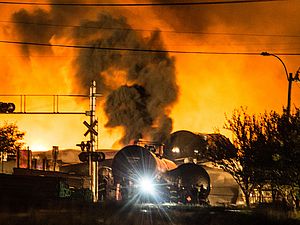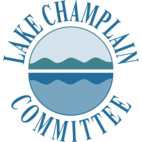Oil Transport Comments Needed by 11/30/14

Oil tank car derailment in Lac Megantic in July 2013. Photo by François Laplante-Delagrave/AFP/Getty Images.
Rail transport of explosive Bakken crude oil through the North Country has increased dramatically due to tremendous growth in outputs from Canada and the Bakken oil fields of North Dakota. Rail incidents in Quebec, Alberta, Alabama, North Dakota, New Brunswick, and Virginia have led to fires and explosions. Last year's derailment at Lac-Mégantic, Quebec killed 47 people and devastated the community. Don’t let the next accident happen in our backyards.
- Each week between 15 and 30 million gallons of Bakken crude oil travel along Lake Champlain carried by five to nine trains with up to 100 cars each (train volume reported by Canadian Pacific). The trains run through small communities and the City of Plattsburgh, within a short distance of schools, homes, businesses, farmlands, tourist accommodations, campgrounds, beaches and municipal offices.
- Oil from the Bakken fields of North Dakota is much more flammable than oil from other sources and has been implicated in numerous rail car explosions.
- Rail tracks sit right on Lake Champlain between the Saranac River and the Air Force Base in Plattsburgh, from the mouth of the Ausable River to south of Willsboro Bay, and from Port Henry south to Whitehall. The tracks also cross the Saranac, Ausable, and Boquet Rivers.
- Emergency preparedness for an oil spill in Lake Champlain is weak. The emergency response plan for the Lake Champlain region has not been updated to reflect the dramatic increase in oil train traffic. State and federal agencies say they will revise the plan by the end of this year, but there is no legal mandate to do so.
- Most oil spilled in water is never recovered in clean-up. Impacts on aquatic organisms can linger for decades.
- Rail cars called DOT-111s account for 69 percent of the U.S. oil-by-rail fleet and 80 percent of the Canadian fleet. They are not designed for hauling explosive liquids and are prone to puncture and leakage even in low-speed accidents. These failures were identified in a 1991 safety study but have still not been addressed.
- Canada’s transport minister called for the phaseout of DOT-111s over the next few years and ordered 5,000 of the most dangerous cars off the rails. In late July, The U.S. Department of Transportation (DOT) proposed a gradual phaseout of DOT-111s for hauling bakken crude, but the process will take several years. In the interim, DOT projects that several more major accidents could occur.
You can influence important upcoming decisions on this issue!
Please file comments by 11/30/14 with the New York Department of Environmental Conservation (NY DEC). Further information is below about where to send your comments along with our contact information should you want help in crafting your message.
Prevent tar sands from being transported through our communities
Global Partners, an oil shipping company, has submitted plans for an oil heating facility in Albany that would allow shipment of Canadian tar sands oil. Tar sands would travel by train to Albany, and down the Hudson river by barge to East Coast refineries. Tar sands oil is viscous and dense; it sinks to the bottom when spilled in water. Most clean-up efforts of heavy crude recover 10-20 percent, at best. The rest stays in the environment. The NY DEC is currently accepting comments on the plan for a heating facility for heavy crude at Albany. Tell NY DEC that any expansion at Global Partners’ terminal should undergo a full environmental impact review that includes analysis of impacts of oil transport via rail throughout the region including along Lake Champlain.
Send comments on Global Partners’ plan by 11/30/14.
Click here for more information
By Email: DEP.R4@dec.ny.gov
By Mail: William Clarke, NYSDEC Region 4 Headquarters, 1130 North Westcott Rd, Schenectady, NY 12306
Contact your federal representatives and ask them to ban use of DOT-111s for oil transport
NY Senator Charles Shumer
NY Senator Kirsten Gillibrand
NY Congressman Bill Owens
VT Senator Patrick Leahy
VT Senator Bernie Sanders
VT Congressman Peter Welch
Stay involved
Please contact LCC if you'd like to see the comments we filed with New York DEC, need help crafting your message, or want to discuss this issue further.
